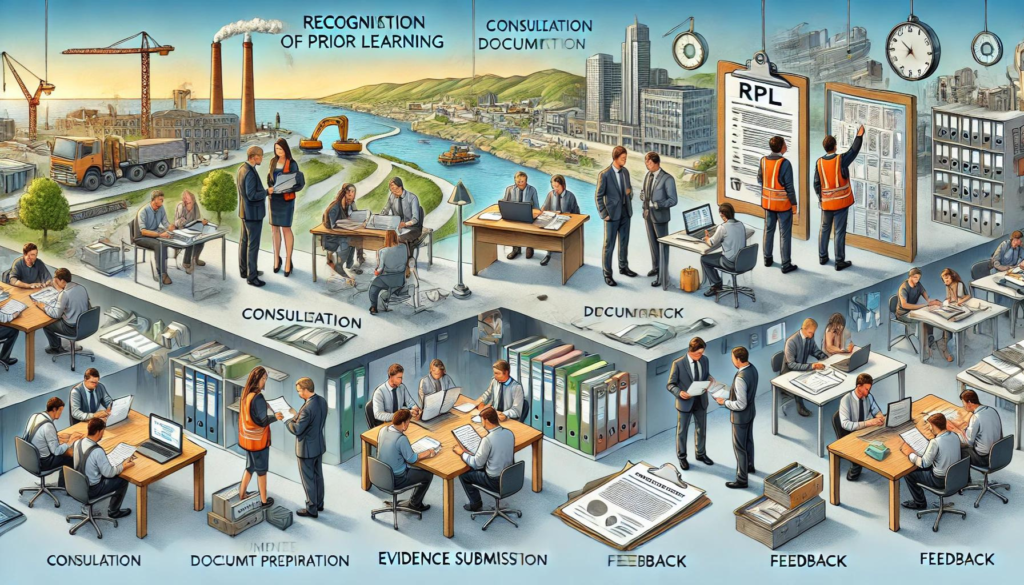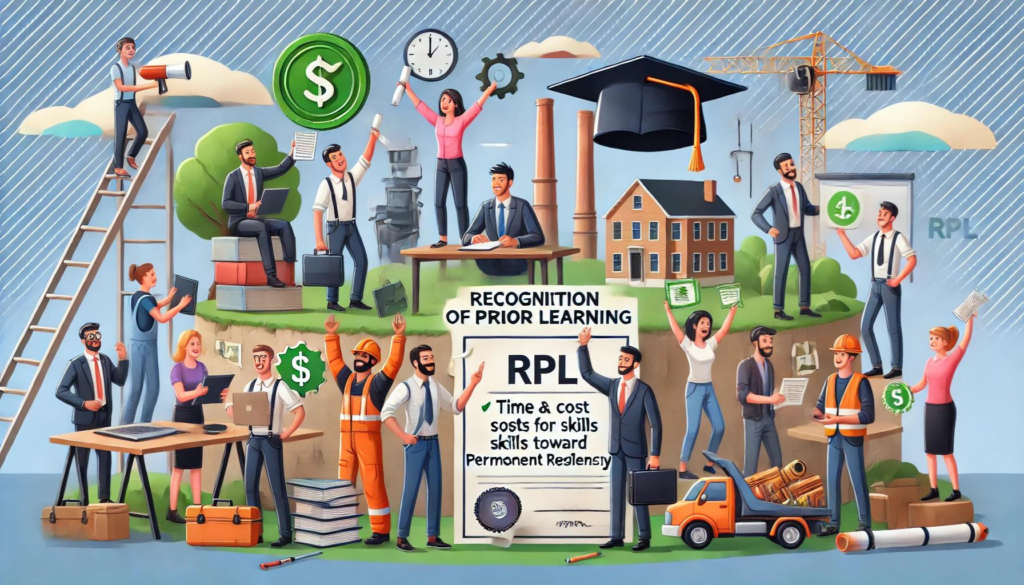Recognition of Prior Learning (RPL) is a formal process that allows individuals to have their existing skills, knowledge, and experience recognized without the need for additional study. So, what is RPL exactly? It’s a way to gain formal qualifications based on informal or non-formal learning, such as work experience, on-the-job training, volunteering, or life experiences. Through RPL, individuals can save time and money by not repeating learning they’ve already achieved.
RPL assessments evaluate a person’s prior learning by reviewing evidence such as work portfolios, job descriptions, or practical demonstrations. This process is widely applied in sectors like education, trade, and immigration. For instance, in Australia, RPL is used to assess qualifications for skilled migration or to meet licensing requirements in specific trades.
To learn more about how RPL is regulated and applied, visit the Australian Skills Quality Authority’s RPL information page. The Department of Employment and Workplace Relations also provides more details on skills and licence recognition, which includes RPL as part of its initiatives(ASQA)(Employment Relations).

How Does RPL Work?
The Recognition of Prior Learning (RPL) process is designed to formally assess and recognize the skills and knowledge that individuals have acquired through their work, life experience, or informal learning. Here’s a breakdown of how RPL works:
Documentation: The first step involves gathering evidence of your prior learning. This could include resumes, job descriptions, work portfolios, references from employers, or records of training you’ve received on the job. The documentation should showcase your competencies and how they align with the learning outcomes of the qualification you are seeking.
Assessment: Once your documentation is submitted, an assessor from a Registered Training Organization (RTO) reviews it. RTOs are licensed by the Australian government to deliver vocational training and assess qualifications through RPL. The assessor may also ask for additional evidence or conduct practical demonstrations to ensure your competencies meet the standards of the relevant qualification.
Certification: After your assessment is complete, if your prior learning is deemed equivalent to the required competencies, you’ll receive formal certification or partial credits toward a qualification. This certification is recognized across Australia, enabling you to access education, jobs, or licenses more easily without the need for additional formal study.
Types of Qualifications RPL Applies To: RPL can be applied to a variety of qualifications, particularly within the Vocational Education and Training (VET) sector in Australia. This includes trades, technical roles, business management, and various other sectors. It is especially useful for migrants seeking recognition of overseas qualifications or for workers in industries where skills are acquired informally on the job.
Role of Registered Training Organizations (RTOs): RTOs play a crucial role in the RPL process. They are responsible for evaluating your evidence, conducting the assessment, and awarding qualifications. To ensure the credibility of the RPL process, RTOs follow strict standards set by the Australian Skills Quality Authority (ASQA), which oversees vocational education across the country.
For more information on RPL and how it applies in Australia, you can visit the Australian Government’s RPL page or learn about the role of RTOs in the process(ASQA)(Employment Relations).

Benefits of RPL
Recognition of Prior Learning (RPL) provides numerous advantages for individuals looking to formalize their skills and experiences, whether for education, employment, or migration. Below are the key benefits:
Save Time and Money on Formal Education:
One of the primary benefits of RPL is that it allows individuals to bypass traditional education pathways by recognizing skills they already have. Instead of attending full courses, RPL lets you gain qualifications based on your existing knowledge, saving time and the cost of tuition. This is particularly useful for professionals who have gained substantial experience in their fields but lack formal qualifications. By having their prior learning assessed, they can quickly gain certifications that would otherwise take months or years to achieve.Practical Outcomes:
- Trade Licenses: RPL can be critical in helping workers, especially those in trades, obtain the necessary licenses to practice in Australia. For individuals who have gained their skills through years of work or informal training, RPL provides a pathway to formal certification that meets industry standards.
- Pathway To Permanent Residency: For migrants, RPL plays a vital role in meeting visa requirements. By having their skills and qualifications formally recognized, they can gain the points needed to qualify for skilled migration visas. RPL can therefore be a stepping stone towards permanent residency in Australia. More information on how RPL can contribute to migration goals is available on the Australian Government Department of Home Affairs website.
- Career Advancement: RPL can also lead to better career prospects by turning informal learning into formal qualifications that are recognized by employers across various industries. This is especially beneficial for professionals seeking promotions or transitioning into new roles.
Boost Confidence and Enhance Job Applications:
Having your skills validated through formal recognition can significantly boost your confidence. It also enhances your resume, making you more competitive in the job market. Whether you’re looking to change careers or progress in your current field, RPL allows you to stand out by formally proving your competencies. This makes it easier to apply for jobs that require specific qualifications and demonstrates to employers that you meet industry standards.

Who Can Apply for RPL?
Recognition of Prior Learning (RPL) is available to a wide range of individuals, from students and professionals to migrants. Essentially, anyone who has acquired skills and knowledge through informal learning, work experience, or previous training may be eligible to apply for RPL.
Eligibility Criteria for RPL
Work Experience: If you’ve gained significant experience on the job, RPL can recognize the skills and knowledge you’ve developed, even if you haven’t been formally trained in a classroom setting. Many trades and industries, such as construction, healthcare, and hospitality, are suitable for RPL if you can provide evidence of your competencies.
Informal Learning: Individuals who have learned skills through informal training, such as volunteering, internships, or community involvement, may also qualify for RPL. For example, someone who has managed events as a volunteer may apply for RPL in event management courses.
Previous Education: If you’ve completed courses or gained qualifications in the past, but you’re now seeking a formal qualification or certification, RPL can assess and credit your previous learning towards a new qualification. This is especially useful for professionals who are switching careers or advancing in their current field.
How RPL Benefits Different Groups
Students: Students who have already gained relevant skills outside formal education can use RPL to fast-track their way to a qualification. By providing evidence of what they already know, students can avoid redundant coursework and focus on areas where they need further learning. RPL can also help students transfer credits if they are moving between educational institutions.
Professionals: For professionals, RPL offers a pathway to formalize the skills they have gained on the job. Whether you’re looking to get certified in your field or transition to a new career, RPL can recognize your existing skills and give you the qualifications necessary to advance. Many industries, especially those requiring licenses or certifications, rely on RPL to streamline the process of gaining formal recognition.
Migrants: Migrants often use RPL to have their overseas qualifications recognized in Australia. This is particularly useful for those applying for skilled migration visas, as it allows them to demonstrate that their skills meet Australian standards. RPL can also assist migrants in obtaining trade licenses or qualifying for jobs in sectors where formal qualifications are required. For more information on how RPL supports migration, you can visit the Department of Home Affairs Skilled Migration page(Immigration and citizenship Website).
By providing a flexible and efficient path to qualification, RPL empowers individuals to move forward in their careers, regardless of where or how they’ve acquired their skills. You can learn more about eligibility and the RPL process by visiting the Australian Skills Quality Authority(ASQA).
Steps to Apply for RPL
Applying for Recognition of Prior Learning (RPL) is a straightforward process designed to assess and formalize your skills and knowledge. Follow these simple steps to complete your RPL application:
Schedule Your Free Consultation: The first step in the RPL process is scheduling a 15-minute consultation with our team. During this consultation, we will discuss your goals, review your experience, and help you understand the best qualification path based on your skills and aspirations. Book your consultation through our RPL page here.
Prepare Documents: Collect and prepare evidence that showcases your skills, knowledge, and work experience. The types of evidence you may need include:
- 100 Points of ID (e.g., passport, driver’s license)
- Academic Qualifications (certificates, diplomas)
- Unique Student Identifier (USI)
- Resume or detailed CV
- Proof of Employment (e.g., employment contracts, reference letters)
- Payslips
- Photos/Videos of your work demonstrating your skills
- Visa Documents (for migrants applying for RPL)
Submit Your Evidence: Once your documents are prepared, submit them to our RPL assessor for a comprehensive review. It’s important that the evidence clearly demonstrates your competencies and aligns with the qualification requirements. Our assessor will evaluate your experience and skills based on the standards set for your desired qualification.
Assessment and Feedback: Our assessor will review your submitted evidence to determine if it meets the required competencies for the qualification. In some cases, you may be asked to provide additional evidence, such as undergoing practical demonstrations, interviews, or assessments, to verify your skills. You will receive feedback throughout this process, ensuring all your competencies are covered.
Outcome:
- Recognition: If your evidence meets the qualification standards, you will receive recognition for the relevant units of competency, or even the full qualification.
- Further Action: If gaps are identified in your skills or experience, you will receive constructive feedback and may be required to undergo additional training or assessments to meet the necessary standards.
Certification: Upon successful completion of the RPL process, you will be awarded a nationally recognized qualification. This certification can help boost your career, open up new job opportunities, or meet immigration requirements.
For a detailed look at the steps and to start your application, visit our RPL page.
Frequently Asked Questions (FAQs)
1. How long does the RPL process take?
The length of the Recognition of Prior Learning (RPL) process varies depending on how quickly you can gather and submit your evidence, as well as the complexity of your qualifications. Typically, the process can take anywhere from a few weeks to a couple of months. After submitting your documents, an assessor will review your evidence, and additional time may be required if further evidence or practical demonstrations are needed. We aim to complete the process as efficiently as possible to help you achieve your qualification.
2. How much does RPL cost?
The cost of RPL depends on the qualification you’re applying for and the services provided by the assessing organization. Fees can range from a few hundred to several thousand dollars, depending on the level of qualification and the extent of the assessment required. For a detailed breakdown of costs, it’s best to consult with our team during your free consultation. You can book your consultation on our RPL page.
3. What kind of evidence do I need for RPL?
To successfully apply for RPL, you’ll need to provide a range of evidence that demonstrates your skills and experience. Common forms of evidence include:
- 100 Points of ID (e.g., passport, driver’s license)
- Academic Qualifications (certificates, diplomas)
- Proof of Employment (employment contracts, reference letters)
- Resume/CV detailing your work experience
- Payslips from relevant jobs
- Photos/Videos showcasing your work or skills
- Visa Documents (for migrants applying for RPL)
This evidence will be reviewed by an RPL assessor to ensure that your competencies meet the requirements for the qualification. For more tips on gathering the right evidence, check out our RPL process guide.
Conclusion
In summary, Recognition of Prior Learning (RPL) is an invaluable process for individuals who want to formalize their skills and knowledge without spending unnecessary time in formal education. RPL can help you save time and money, gain industry-recognized qualifications, and even fast-track your path to migration or career advancement. Whether you’re a student, professional, or migrant, RPL offers a flexible way to turn your existing experience into formal recognition that opens new doors.
If you’re looking to boost your career, transition into a new field, or meet visa requirements, consider applying for RPL today. Our team at Australian Global Education Consultancy can guide you through the entire process, from gathering your evidence to receiving your certification. Take the next step toward fast-tracking your education and career by exploring your RPL options with us.






